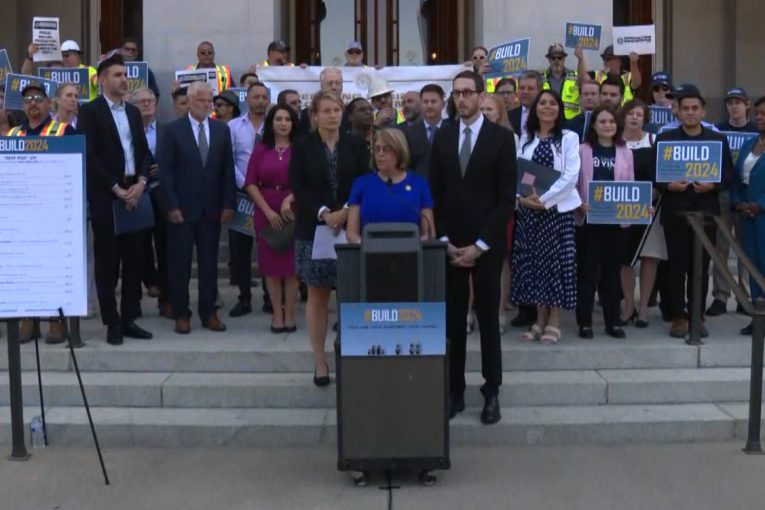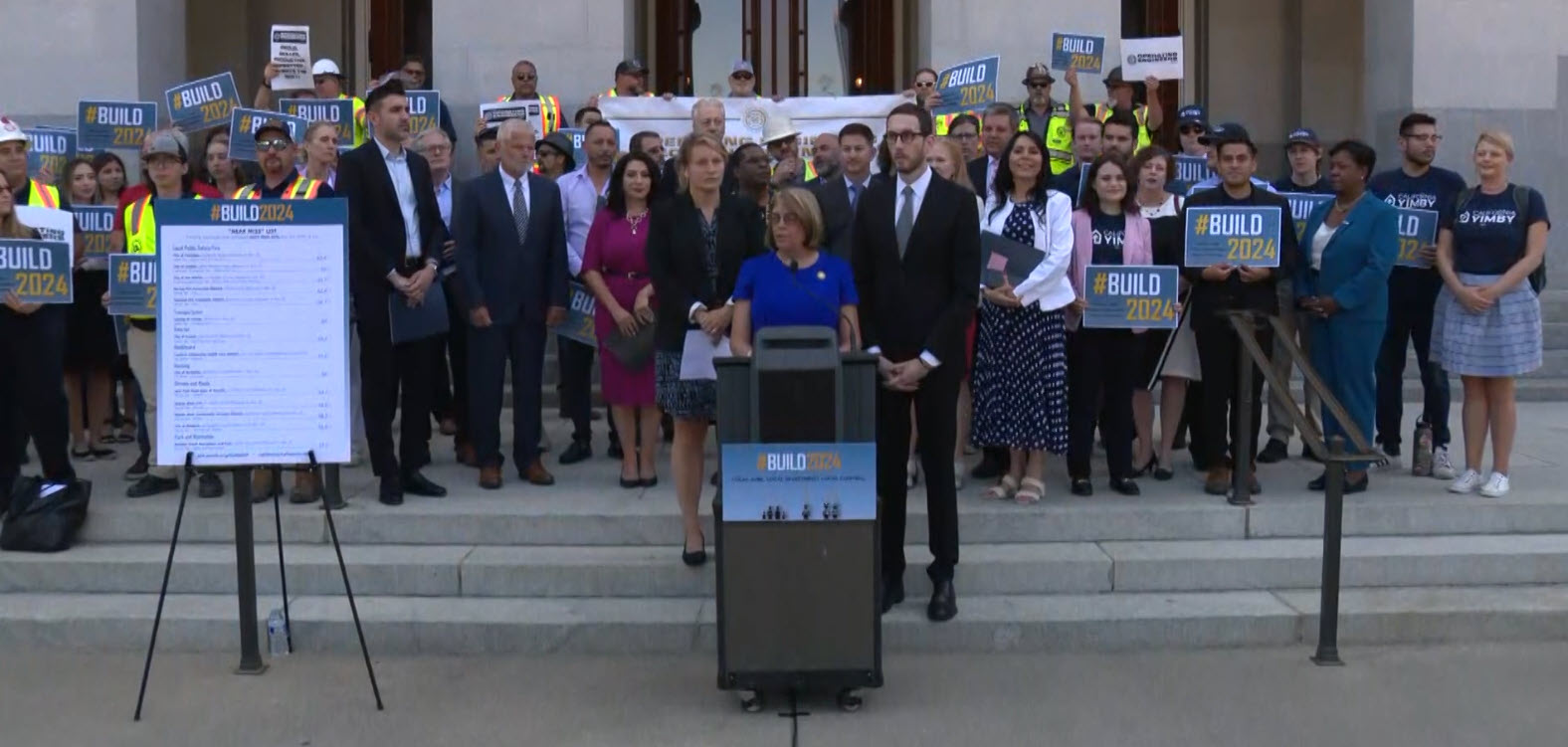

By the Vanguard
Sacramento, CA – Assembly Speaker pro Tempore Cecilia Aguiar-Curry along with leaders from across the state on Thursday rallied in front of the Capitol in support of ACA 1.
Aguiar-Curry was joined by coauthoring legislators and advocates for local governments, housing, labor, public safety, transportation, and conservation including among others Senator Scott Wiener and Assemblymembers Matt Haney and Alex Lee.
“As a former Mayor of Winters, and board member of regional water, housing, and transportation agencies, I have seen first-hand the deterioration of our once world-class infrastructure,” said Assemblymember Aguiar-Curry. “ACA 1 is targeted to help the urgent needs of local communities to increase the supply of affordable housing and supportive housing for our working families and vulnerable populations, but you can’t build housing without roads, sewers, and fire stations. This is why we are focused on housing and the infrastructure supporting it.”
ACA 1 would reduce the local vote threshold for bond approval and special tax measures from a two-thirds vote to a 55 percent supermajority. This same vote threshold currently applies to all local school construction bond measures. By making this change, ACA 1 puts housing and infrastructure projects on par with school proposals so that cities, counties, and special districts have a practical financing tool to address community needs.
“One of the shortcomings of current constitutional supermajority vote thresholds is they take away the ability of local officials, especially in small cities and rural areas like mine, to work with their voters to make investments in local infrastructure priorities,” continued Assemblymember Aguiar-Curry.
She added, “What that means is Sacramento is forced to do huge statewide initiatives, and those same communities often don’t benefit from them. My constituents are paying for housing,  roads, and police and fire stations in large metropolitan areas and can’t even pass their own bonds and sales taxes to fund their local priorities.”
roads, and police and fire stations in large metropolitan areas and can’t even pass their own bonds and sales taxes to fund their local priorities.”
“Ultimately, ACA 1 gives California voters greater control over how their taxes are spent and raised, and makes us better able to meet the challenges that we as firefighters face in California,” said Brian K. Rice, President of California Professional Firefighters. “ACA 1 is not a tax, and it doesn’t raise a dollar of new revenue. It is a chance for the voters to look at the 2/3 versus a 55% threshold and make a decision on that.”
“Local fire departments across California are struggling with tight budgets even as the need for emergency services is on the rise. Far too often voters up and down the state have made their voices clear as they stepped up to support local propositions that provide secure funding for public safety only to fall short despite winning the majority of the vote,” said Frank Lima, General Secretary-Treasurer of IAFF (International Association of Fire Fighters). “ACA 1 will create a more democratic process that allows voters the opportunity to abandon the unreasonable 2/3 vote threshold and establish a more fair 55% threshold to approve measures that help keep the public safe.”
“ACA 1 will empower Californians to take action in their communities,” said Chris Hannan, President of the State Building and Construction Trades Council. “By lowering the bond approval threshold from a supermajority requirement to 55 percent, local governments will be able to invest in vital projects that provide our members with thousands of good paying jobs and tackle the critical needs of our communities throughout the state.”
“ACA 1 will bring power back to local voters and communities by ensuring that the will of the voters is represented. It will give local governments the tools they need to address our communities’ affordable housing needs and wants,” said Amy Fishman, Executive Director of NPH. “This is the kind of game-changing affordable housing policy we need — to strengthen local communities, protect the will of voters, address local infrastructure challenges, and level the playing field.”
“ACA 1 is carefully crafted to preserve and protect the will of an overwhelming majority of local voters,” emphasized Bruce Gibson, Supervisor, County of San Luis Obispo and First Vice President of CSAC, “I urge the Legislature and the Governor to move this important issue to the ballot so that voters can be heard.”
“From Sonoma to San Diego, communities across the state have benefited from self-help measures that have funded the development of their local public transit systems. In the years ahead, these measures will take on increasing importance as we strive to build transit systems that are more sustainable, equitable, and accessible,” said Michael Pimentel, Executive Director of the California Transit Association. “We applaud Speaker pro Tem Aguiar-Curry for pursuing ACA 1 to provide more California communities with the opportunity to enact the self-help measures they need to transform their mobility options.”
The California Constitution limits the opportunity for communities to decide to tax themselves to provide funding for local projects that meet goals and laws approved by the majority. One-third of local voters have the power to overrule fiscal decisions. ACA 1 proposes an amendment to the California Constitution. If passed by the Legislature, the proposal would go to the 2024 November ballot for voter approval during the next statewide election.






I’ve never understood the supermajority requirements. There’s already a status quo bias in voters’ minds, and a two-thirds threshold gives “no” voters two votes for every “yes” vote. Within a legislative body, a supermajority requirement can force compromise, but there’s no opportunity for negotiation in an election–it’s yes or no. The only supermajorities should be for constitutional amendments (and a constitution should be very limited to rules of procedure and basic principles.)
In other words in makes it harder to impose parcel taxes on hard working homeowner families who are trying to just get by and pay their mortgage and other bills in this day of high inflation. Maybe I missed it, but nowhere in the article did I read anything about making it easier to raise parcel taxes, only sales taxes and bonds. Was that an omission by accident?
LOL, technically “not a tax”, but will definitely lead to much more taxation. You have to laugh at how this stuff gets worded.
Probably not an “accident”.
You’d think that those concerned about the ongoing cost of housing would be concerned about this proposal.
That’s why people don’t trust politicians, or anything coming out of Sacramento.
Or is it simply a way to impose more taxes (parcel taxes) on homeowners who many if not most are already struggling to get by in order to build housing for others at existing homeowners expense?
I believe that Aguiar-Curry hitched her wagon to Scott Wiener’s wagon train a long time ago.
Leaving the choice between a YIMBY Democrat, vs. a Republican.
And given that Republicans have zero chance in this district, the local representative will continue to support corporate YIMBYism.
Which reminds me of what George Carlin said about voting.
The system is rigged.
I don’t know about the first line. Aguiar-Curry was pro-housing and pro-economic development long before anyone ever heard of Scott Wiener.
Perhaps it was Scott Wiener who was a “protege” of Aguiar-Curry, then.
They both started at lower political levels – don’t know who was first.
But yeah, the policies she promotes are horrible.
This is what our system has to offer. And there’s a reason for that – politicians need the support of those types of interests to win elections in the first place.
You offered that the system is rigged, perhaps in part because you’re in the minority on this issue.
Seems to me that I’m in the majority, if you consider something like DISC (and probably Measure J itself), in comparison to Aguiar-Curry.
And how the entire corporate YIMBY movement is increasingly being viewed – across the entire state.